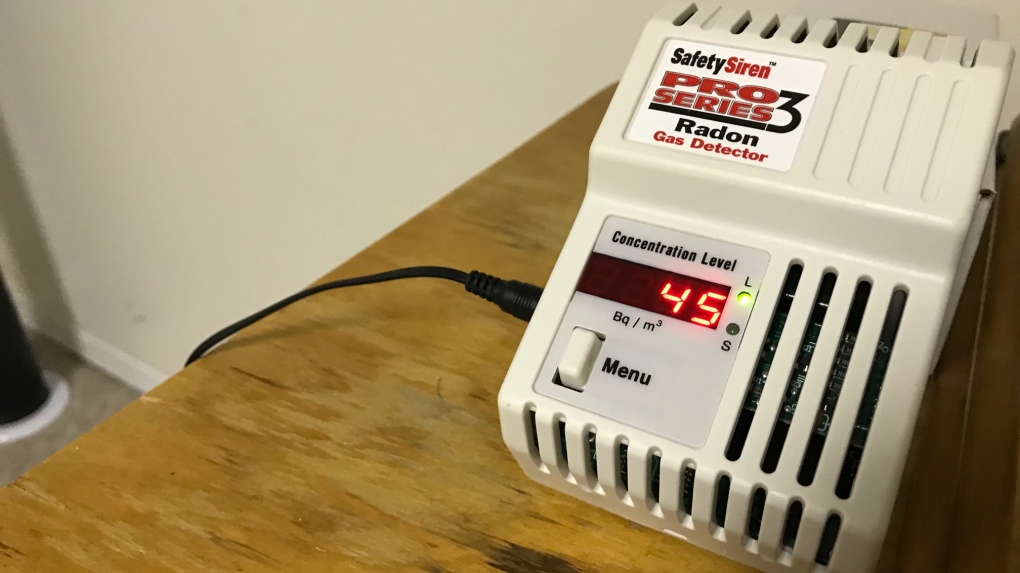Not enough being done to mitigate radon in Canadian homes, joint Alberta-B.C. study suggests

A new study suggests that residents who take action on radon gas in their homes are at a much lower risk of developing lung cancer over the long-term.
The research, published on Nature.com, found that anyone who takes steps to test for and reduce exposure to radioactive radon gas can reduce their lifetime risk of lung cancer by almost 40 per cent.
Scientists in the study, who were from both the University of Calgary and University of B.C., discovered some Canadian homeowners are absorbing more than 100 millisieverts – the unit used to measure radiation doses – of radiation into their lung each year.
"To put this into perspective, these are radiation doses known to have caused cancer after the Chernobyl accident," said Dr. Aaron Goodarzi, lead researcher and biochemistry professor at the Cumming School of Medicine.
"This could explain why, even though Canadian tobacco use is amongst the lowest in the world, our rates of lung cancer diagnosis and death are amongst the highest."
Radon gas is the leading cause of lung cancer in non-smokers, the U of C says, making up between one in five and one in three lung cancer cases in Canada.
The data collected in the study also suggests low-income families may be at greater risk, considering they cannot properly invest in testing for and mitigating radon gas in their homes.
Researchers say this points to government needing to take a larger role to provide solutions.
"This work also highlights a new health equity issue for Canada as, at present, people who do not smoke but who are exposed to high levels radon would not qualify to be included in the lung cancer screening programs emerging across Canada," said Dr. Cheryl Peters, a professor in community health sciences and senior scientist at the BC Centre for Disease Control and co-author of the study.
According to Alberta Health, radon is found in rock, soil, water, some building materials and natural gas.
"Radon is found in new and old buildings. It can seep in through any opening where the building contacts the soil. If a house's water supply contains radon, radon may enter the air inside the house through pipes, drains, faucets, or appliances that use water. Then the radon may get trapped inside the house," said the province's website.
Nearly one out of every 15 homes in Canada possess unsafe levels of radon.
CTVNews.ca Top Stories

Canadian team told Trump's tariffs unavoidable in short term in surprise Mar-a-Lago meeting
During a surprise dinner at Mar-a-Lago, representatives of the federal government were told U.S. tariffs from the incoming Donald Trump administration cannot be avoided in the immediate term, two government sources tell CTV News.
Toronto man accused of posing as surgeon, performing cosmetic procedures on several women
A 29-year-old Toronto man has been charged after allegedly posing as a surgeon and providing cosmetic procedures on several women.
W5 Investigates 'I never took part in beheadings': Canadian ISIS sniper has warning about future of terror group
An admitted Canadian ISIS sniper held in one of northeast Syria’s highest-security prisons has issued a stark warning about the potential resurgence of the terror group.
Trump threatens 100% tariff on the BRIC bloc of nations if they act to undermine U.S. dollar
U.S. president-elect Donald Trump on Saturday threatened 100 per cent tariffs against a bloc of nine nations if they act to undermine the U.S. dollar.
Poilievre suggests Trudeau is too weak to engage with Trump, Ford won't go there
While federal Conservative Leader Pierre Poilievre has taken aim at Prime Minister Justin Trudeau this week, calling him too 'weak' to engage with U.S. president-elect Donald Trump, Ontario Premier Doug Ford declined to echo the characterization in an exclusive Canadian broadcast interview set to air this Sunday on CTV's Question Period.
Bruce the tiny Vancouver parrot lands internet fame with abstract art
Mononymous painter Bruce has carved a lucrative niche on social media with his abstract artworks, crafted entirely from the colourful juices of fruits.
Why this Toronto man ran so a giant stickman could dance
Colleagues would ask Duncan McCabe if he was training for a marathon, but, really, the 32-year-old accountant was committing multiple hours of his week, for 10 months, to stylistically run on the same few streets in Toronto's west end with absolutely no race in mind. It was all for the sake of creating a seconds-long animation of a dancing stickman for Strava.
Former Ont. teacher charged with sexually assaulting a teen nearly 50 years ago
A senior from Clearview Township faces charges in connection with an investigation into a sexual assault involving a teen nearly 50 years ago.
It's time for a good movie this holiday season, here's what's new in theatres
This holiday season has a special edition at the theatres with movies "that everyone has been waiting for," says a movie expert from Ottawa.






























